
Feature
Opening Doors to Innovation
article by Cara Roberts Murez
When concerns about the spread of COVID-19 led to state-ordered closures, Amy Baker at Threadbare Print House in Eugene figured out a way to keep orders flowing while also supporting local restaurants and nonprofits.
Meanwhile, Compass Senior Living harnessed technology to help its vulnerable residents at Evergreen Senior Living stay virtually connected with their loved ones.
Fitzpatrick Painting and Construction turned the downtime from canceled jobs into an opportunity to give back to their communities by delivering groceries to seniors.
And Venue 252 placed employees from its temporarily shuttered event center in roles at its sister Market of Choice’s stores to keep staff working while it created a plan for new ways to safely entertain guests.
What they didn’t do was give up. They turned the disruption into innovation. While there’s little doubt that everyone wants to see this crisis fully resolved and behind us, some of the changes in the local business community will continue even after social distancing requirements are done.
“I just feel like this is a lesson in being flexible and working with unpredictable experiences,” Baker said. “I’m just trying to hang on, build the business, stay positive and hopefully it will all shake out a year from now.”
Threadbare Print House
Leading up to March 13, Baker and her team were getting ready to make T-shirts for a California band’s upcoming tour and a summer camp serving LGBTQIA youth.
“I will never forget that day,” Baker said. “Just email after email, I was realizing this was pretty scary, actually. … Probably that day or over that weekend, we lost 50 percent of our expected revenue for the month.”
Pivoting from the crisis included creating online fundraising stores for clients, selling T-shirts directly to retail customers and splitting the money with the restaurants, nonprofits and bands featured on the shirts.
“They didn’t have to upfront any money. It was a win-win. And it kept our presses running,” Baker said. For retail customers, “I think the motivation was fundraising for their favorite restaurants, trying to keep them alive.”
Threadbare also began selling masks, screen printed or plain. “The margins are smaller and it’s not as profitable as our regular business,” Baker said, “but it’s definitely helping to keep us alive.”
The business was one of at least 55,000 in Oregon that received a total of more than $7 billion in loans through the Small Business Administration Paycheck Protection Program. At Eugene’s Summit Bank alone, staff worked to secure 440 loans totaling $114 million for businesses and nonprofits in Eugene and throughout Oregon.
According to the Oregon Employment Department, Lane County went from record low March unemployment of 4.1% to a record high April rate of 16.1%, with cuts of 25,700 jobs. Diverse sectors suffered big losses. For May, the rate slightly improved to 14.4 percent.
Oregon’s Office of Economic Analysis is forecasting that, though the recession is the deepest on record in Oregon, its duration should be shorter than the great recession as confidence returns once there is a vaccine for COVID-19.
At Threadbare, traditional orders are slowly increasing. Meanwhile, staff practice social distancing, wear masks at work and wipe surfaces. Among the changes likely to be permanent are requiring customers to schedule appointments, rather than drop in. Baker also now does some of her work from home, finding more work-life balance.
Evergreen Senior Living
As the crisis unfolded, Eugene’s Evergreen Senior Living, home to about 125 residents, made significant moves to keep its people safe. Evergreen, one of several communities managed by Compass Senior Living, employs 80 to 90 people.
Evergreen limited visitors to its campus and made additional restrictions in its dining room and in how residents interact socially with each other. Not having families drop in is a huge change for residents, said Amira Fahoum, education and programs leader. Staff instead made virtual connections for families, as well as window visits or outside visits where everyone wears masks and stays six feet apart.
Regular temperature checks for staff and residents are now standard. Staff wear masks and residents are asked to wear masks when in communal areas. Anyone with the slightest indication of fever or symptoms does not come to work.
Evergreen had no positive cases of COVID-19 by mid-June. Meanwhile 2.39 million people were diagnosed with COVID-19 in the United States and more than 123,000 people had died as of June 24. In Oregon by that same date, there were 195 deaths and 7,444 people had tested positive.
“We’re recognizing the value of offering paid time off because our employees will need to use it,” Fahoum said. “We have to be very careful. We just have to remain diligent every single step of the way. …There won’t be a ‘back to normal’ for us.”
Venue 252
At Venue 252 customer cancellations or postponements started near the middle of March. In striking contrast, its sister business – Market of Choice – shifted into full speed as demand for food and paper products soared. Venue 252 staff moved to store locations, stocking produce and cooking.
“I think that as the initial shock subsided, we asked ourselves ‘Well, what is the opportunity here?’” said Amy Schnoor, catering and events sales manager. “It allowed us to get creative.”
So, management figured out how to add sanitation, spread out guests and stagger arrivals. Activities will involve less mingling. Venue 252 is also looking into holding virtual or hybrid events, which will require an investment in planning and equipment. Yet, it’s a trend they see and want to be a leader, Schnoor said. She expects that extra attention to sanitation will stay with the business even once the pandemic is over.
“No one wanted this virus to come into our community. If we can be proactive to prevent the spread of a future virus, whether it’s COVID or another version of something terrible, we can try to prevent being part of that spread,” Schnoor said.
Fitzpatrick Painting and Construction
Business is already back to normal at Fitzpatrick Painting and Construction, which offers services throughout the Willamette Valley and is considered an essential service.
With 55 to 105 employees depending on the season, Fitzpatrick does both residential and commercial interior and exterior painting, floor coatings, and construction. A ”handful” of customers canceled jobs, a “larger handful” postponed and others kept their plans using new COVID-19 safe work practices, said owner Tim Fitzpatrick.
The company filled in downtime delivering groceries and running errands for seniors, allowing them to stay safely at home. They spread the word about the service through social media channels.
“If it wasn’t for the people in the community, we wouldn’t exist,” Fitzpatrick said. “Why not lend a helping hand when we have the ability to do that when something like this comes down.”
About 90 percent of their jobs are outside this time of year, Fitzpatrick said. When they’re doing interior work, they wear masks if asked. Some estimators are also using Zoom or Facetime to do virtual estimates.
“If you would have told me we would be doing that six months ago, I think we all would have laughed,” Fitzpatrick said. “Now, we’re doing it for our customers.”
“I don’t see these things going away anytime soon,” Fitzpatrick said. “I’d love to think, and I think we’d all love to believe, the day will come that it’s going to be back to normal. … I guess time will tell.”











